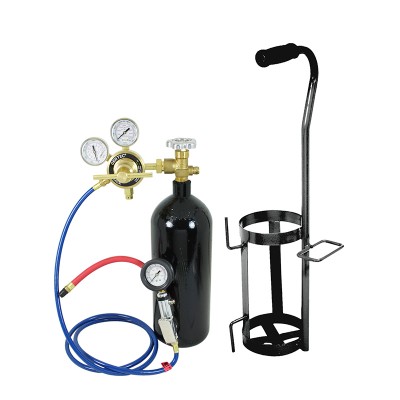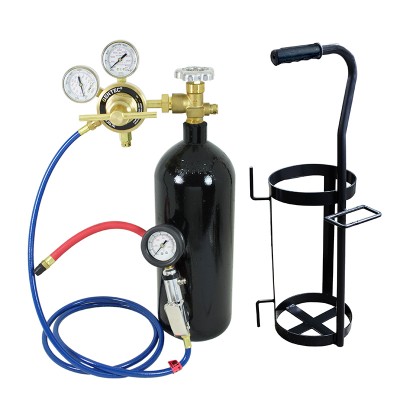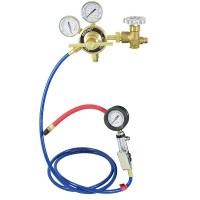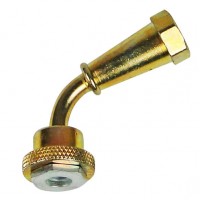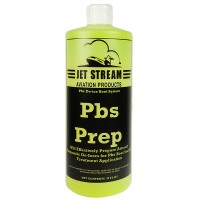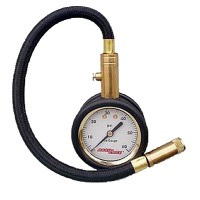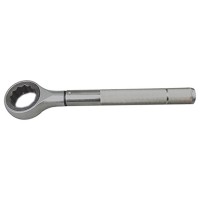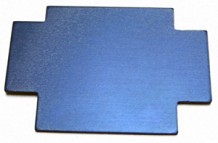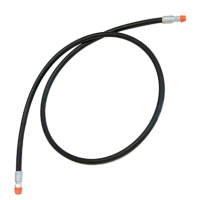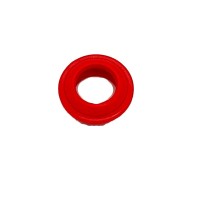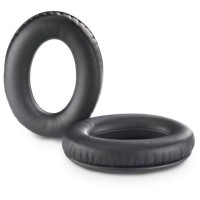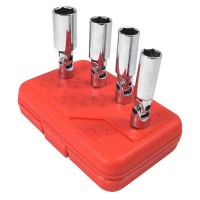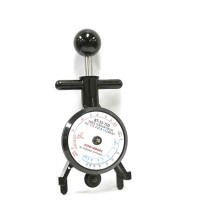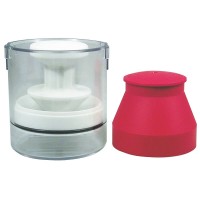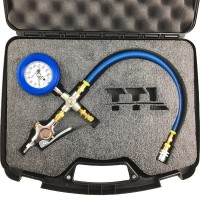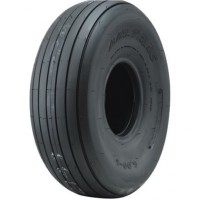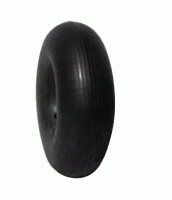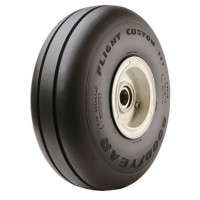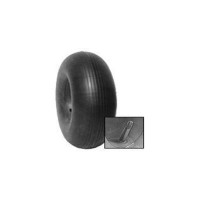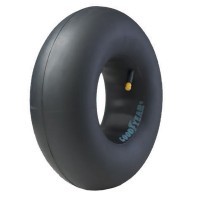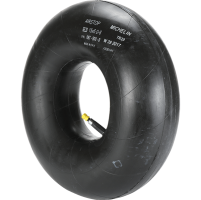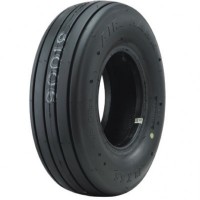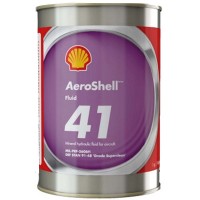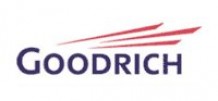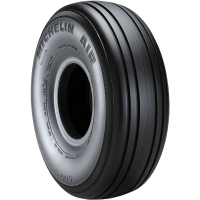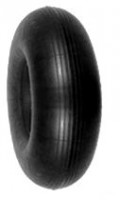Overview
Note: Per vendor, the included CGA580 tank is DOT & TC Approved. All nitrogen tanks are shipped empty and will require local fill.NOT FOR STRUT USEGENTECŪ Nitrogen aircraft tire inflation systems allow for easy, cost effective filling of General Aviation aircraft tires with pure Nitrogen. Due to the complex nature of construction and the severe operating conditions of aircraft tires, Michelin and other leading tire manufacturers recommend the use of Nitrogen as does the FAA. Nitrogen is a totally inert gas that will not support corrosion or oxidation within aircraft wheels and tires. Compressed Nitrogen has a larger gas molecule than compressed air, so low tire pressure due to allowable leakage is minimized. Gentec Nitrogen aircraft tire inflation systems are available in two versions. The GKNAT20-TC: 12-01586 is a 20 cubic foot high pressure nitrogen tank (empty) with stand, ten foot hose; pressure reducing single stage regulator and tire inflator with resetable dial pressure gauge. The GKNAT40-TC 12-01587 is a 40 cubic foot high pressure nitrogen tank (empty) with stand, ten foot hose; pressure reducing single stage regulator and tire inflator with resetable dial pressure gauge. For more information about aircraft tires for General Aviation and locations for Nitrogen filling of cylinders look at the following web sites. FAA Safety website: www.faasafety.gov |
WARNING: Cancer and Reproductive Harm - www.P65Warnings.ca.gov. |
In The Box
- Blow gun hose 10ft.
- Tire inflation gauge
- Whip end hose 12in.
- Single stage regulator
- Cylinder nitrogen
- Cylinder nitrogen tank
- Manual
Reviews
great system just what was needed!
Nitrogen Inflation System CU40
Nitrogen Tire Inflat/Sys 20Cu
The product work great as I can now fill my tires with nitrogen when they get low with out going to a tire shop. I give five star rating.
Nitrogen Tire Inflat/Sys 20Cu
I haven’t used it yet. Currently getting the cylinder filled with Nitrogen. I was told it cost about $19 to fill. Cylinder tank, valves, and hoses seem to be of good quality. Can’t wait to try it out on my airplane tires.
When the maintenance shop closed down at the airport where the King Air I manage and fly is based, I needed a solution to tire servicing. So, I started shopping for an nitrogen cylinder, regulators, inflator, etc. and could have pieced a servicing kit together, literally from Amazon, and for less money than this kit from Aircraft Spruce would cost. However, one of the main problems was finding a regulator with gauges that read low pressures needed for precise pressures for aircraft tires. Most of the gauges were calibrated in 40 PSI increments. When I found this kit at Aircraft Spruce, I felt confident that it was best fitted to servicing aircraft tires accurately and high quality gauges and regulator, even though I think it is over-priced. The nitrogen cylinder is all DOT compliant, but unfilled of course. The regulator and gauges seem to be good quality. The gauges are marked in small increments good for precise inflation. PSI is marked in Red on the two regulator gauges. The inflator looked OK except that pressure release button on the side of it looked a bit odd. Also, the inflator pressure gauge is marked with PSI in black, instead of Red as is on the regulator gauges. I think that inconsistency in color markings is interesting. I wonder if Gen Tec even noticed that. That lack of color matching is only of concern to me in that it is a crack in the armor of minimizing human factor errors. That caused my rating to drop a 4, instead of a 5. When I received it I went to the local gas distributor and exchanged the new 20 cubic ft. cylinder with a used, refilled one (exchange is the way they do it here.) for only $14.00. Then I went to the airport to service my obviously low nose tire. The inflator worked fine, but the pressure gauge would not retain and show the actual tire pressure. Instead the nitrogen in the tire was released through that odd looking pressure release button. That was because that pressure release valve had fallen apart. The button had slipped off the valve, the valve had fallen into the inside of the inflator, leaving a free path for the nitrogen to escape from the tire. When I got back home, I found the release valve button and spring in the shipping box. I disassembled the inflator and retrieved the valve from inside it and then reassembled the valve (it is a Mickey Mouse assembly) and put the inflator back together and everything now works as it should. I probably voided the warranty on the inflator by taking it apart, but so be it. I dont have a high degree of confidence in that inflator, and will not be surprised if that release valve comes apart again. For all that, the best rating I can give is a 3. Even though I believe that it will serve my needs. I think Genstar Technologies Company could do a better job of selecting components for this kit. Maybe Aircraft Spruce should consider this when they market the GenTec product.
I am disappointed with the product I am sorry to say , the good point was that you sent it in a timely manner , but the product has issues for me . The Nitrogen bottle is a repainted O2 bottle which in itself is no issue , but it is dated 2017 and so will not be filled by my agent past 2023 so we are almost in 2021 now I will really only get two years of use , it cost me a further $150 dollars in tax to get the product delivered so at $500 for two years I dont see this as good value . sorry to be negative but you asked
Q&A
Please note, Aircraft Spruce's personnel are not certified aircraft mechanics and can only provide general support and ideas, which should not be relied upon or implemented in lieu of consulting an A&P or other qualified technician. Aircraft Spruce assumes no responsibility or liability for any issue or problem which may arise from any repair, modification or other work done from this knowledge base. Any product eligibility information provided here is based on general application guides and we recommend always referring to your specific aircraft parts manual, the parts manufacturer or consulting with a qualified mechanic.
Regarding part number 12-01587. Yes, it does have both input and output. PSI depends on the hose, max is 350-400.
The tank is normally filled between 2,000 psi - 2,500 psi. The secondary regulator is actually a tire gauge. The gauge will only read up to 175psi.
Per the supplier: You need to take the tank to a gas distributor and they will fill it for you or exchange a full tank for your empty tank.
The dimensions for Part # 12-01586, the 20cu, are 18"H X 5" W.
Part # 12-01587, the 40cu, dimensions are 21"H X 8"W.
This comes with a black carrying stand that has a handle. It is not on wheels.
Contents of the Accessory Kit (12-01588): Pressure Regulator, Tire fill with reset-able pressure gauge, Six (6') high pressure hose.
Per the supplier, the max working pressure is 160 psi.
Here are the contents of the part # 12-01586: blow gun hose 6', tire inflation gauge, whip end hose 12", single stage regulator, cylinder nitrogen 20 Cu Ft, CYL for 20 Cu Ft nitrogen tank, manual.
Yes, this will fill up the tires to 135psi with no problem. The max pressure this can fill up to is 350psi to 400psi.
You will only need to fill the tank up with nitrogen as this will already come with the fitting to connect to your tires.


